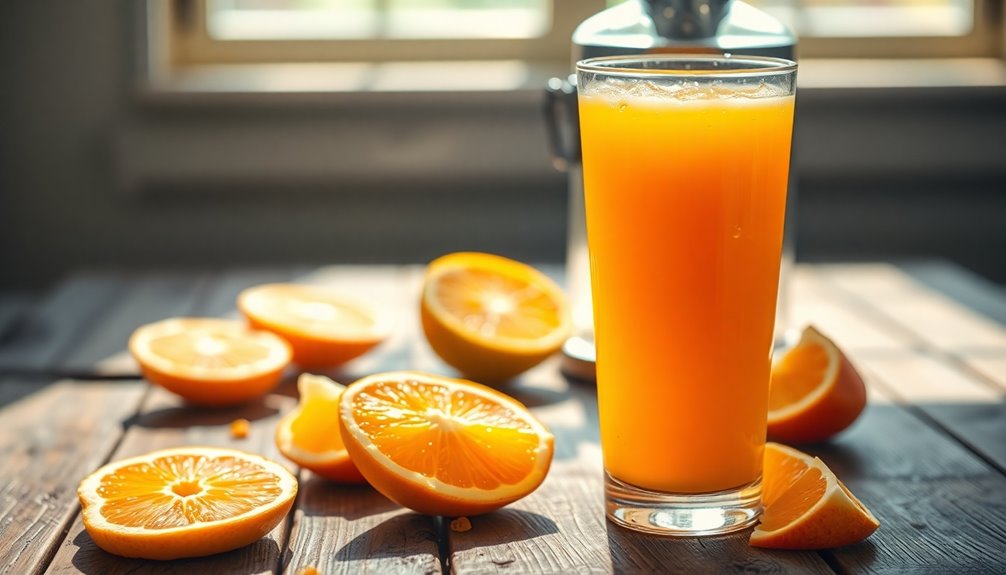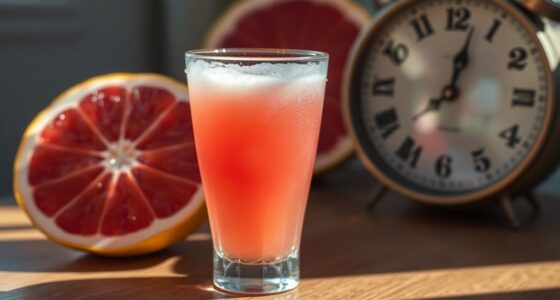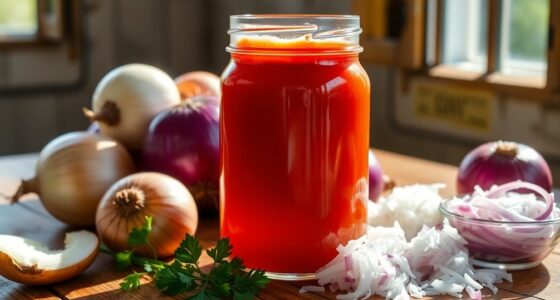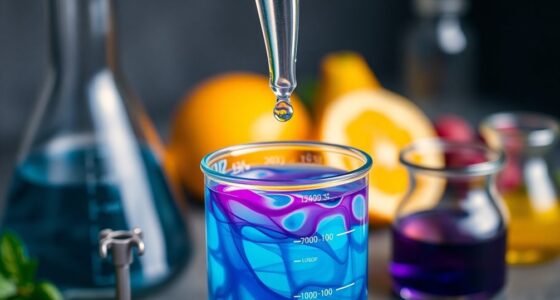Juice from a juicer can last anywhere from 24 hours to several days, depending on the type of juicer you use. Centrifugal juicers keep juice fresh for up to 24 hours, while masticating juicers extend that to 48 hours. Cold-pressed and twin gear juicers can preserve juice for 3 to 5 days or longer. If you want your juice to last even longer, there are effective storage tips to consider. Learn how to maximize your juice's shelf life!
Key Takeaways
- Centrifugal juice is best consumed within 24 hours for optimal freshness and taste.
- Masticating juice can last up to 48 hours due to reduced oxidation.
- Cold-pressed juice can remain fresh for 3-5 days when stored in airtight containers.
- Twin gear juices can last 4-5 days, preserving more nutrients and minimizing oxidation.
- Freezing juice allows for long-term storage of 12-16 months; use airtight containers for best results.
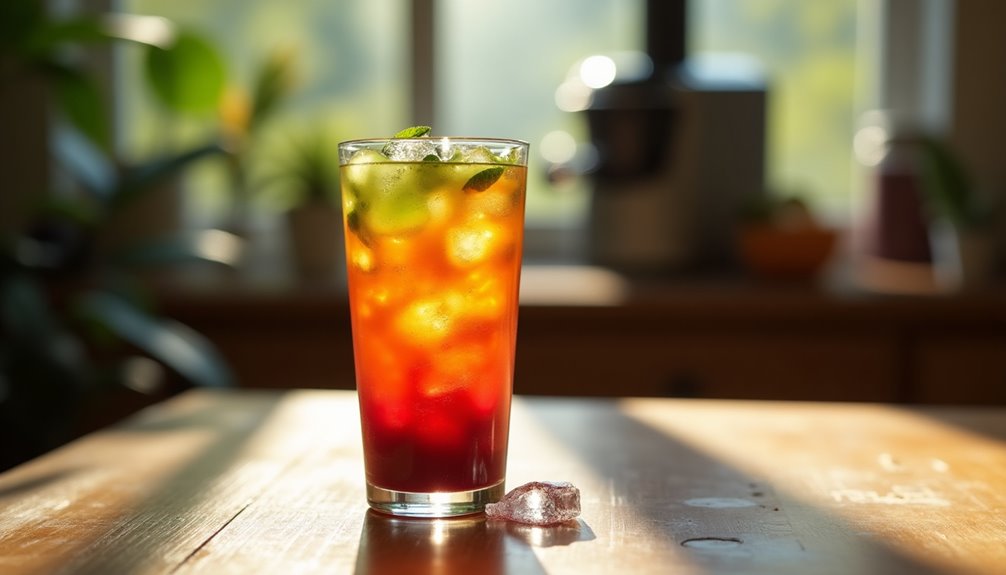
Have you ever wondered how long your fresh juice actually lasts? When you're making juice, it's essential to know how long you can keep your juice before it begins to lose its freshness and nutritional value. The shelf life of juice largely depends on the type of juicer you use and how you store it. Let's break it down so you can enjoy your fresh juice to the fullest.
If you're using a centrifugal juicer, you should know that juice from this type typically lasts up to 24 hours in the fridge. Centrifugal juicers extract juice quickly, which can cause more oxidation, leading to a shorter lifespan. So, if you've whipped up a vibrant blend, make sure you drink it within a day for the best taste and benefits.
On the other hand, if you're using a masticating juicer, you can expect your juice to last up to 48 hours. This juicer works at a slower speed, which helps preserve more nutrients and reduces oxidation, making it a great choice if you want your juice to last a bit longer.
Cold-pressed juice is another excellent option if you're looking to store your juice for a few days. When properly stored in an airtight container, cold-pressed juice generally has a shelf life of 3-5 days. The cold-press method extracts juice without introducing heat, which preserves flavors and nutrients exceptionally well. Just remember to keep your juice in an airtight container in the fridge to ensure it lasts as long as possible.
For those serious about extending the shelf life of their juice, twin gear juicers like the Greenstar Elite are worth considering. Juice from these juicers can last 4-5 days due to their superior ability to minimize oxidation. If you're keen on making juice that lasts, investing in a twin gear juicer might be a game-changer.
Another tip for extending the shelf life of your fresh juice is to freeze it. You can freeze juice for up to 12-16 months without significant nutrient loss. Just remember to use airtight containers to prevent freezer burn. This option is fantastic for anyone who wants to have juice on hand for a longer time.
Adding citrus juice, like lemon or lime, can also help preserve freshness. The acidity in citrus acts as a natural preservative, prolonging the life of your stored juice. So, when you're making juice, consider squeezing in a bit of lemon or lime to keep your juice fresh for longer.
Frequently Asked Questions
How Long Can You Keep Juice After Juicing?
After juicing, you can keep your juice for varying lengths, depending on how you store it.
If you refrigerate it in an airtight container, juice from a centrifugal juicer lasts about 24 hours, while masticating juicer juice can last up to 48 hours.
For cold-pressed juices, aim to consume them within 3-5 days.
How Long Are Juices From Pressed Good For?
Did you know that cold-pressed juice can stay fresh for 3-5 days?
If you're using a cold-pressed juicer, you can enjoy your juice for several days, but make sure to store it in airtight containers.
If you opt for a masticating juicer, aim to drink it within 48 hours.
Remember, proper storage methods, like refrigerating your juice right away, can really help maintain its freshness and nutritional value.
Enjoy your juicing!
Do You Have to Drink Juice Immediately After Juicing?
You don't have to drink juice immediately after juicing, but it's best to do so for maximum freshness and nutrients.
If you can't consume it right away, store it in an airtight, opaque glass container in the fridge.
Adding a splash of citrus juice can help slow oxidation, allowing the juice to stay fresh a bit longer.
Just remember, the sooner you drink it, the better the health benefits you'll receive!
How Long Can Freshly Squeezed Juice Last in a Mason Jar?
You've just made a refreshing batch of juice, and now you're wondering how long it'll last in a mason jar.
Well, if you seal it tightly, it can stay fresh for about 2-3 days in the fridge.
But here's the catch: for the best flavor and nutrients, it's smart to drink it within 24-48 hours.
Want to keep it even longer? Freeze it, and it can last up to 12-16 months!
Conclusion
In the end, fresh juice from a juicer is best enjoyed within 24 to 48 hours for optimal flavor and nutrients. Think of it like a beautiful flower—its vibrancy fades with time. To savor every drop of that liquid sunshine, store it in an airtight container and keep it refrigerated. So, when you whip up a batch of your favorite juice, drink it up quickly to make the most of all those delicious vitamins and minerals!
Cindy thoroughly researches juicing trends, techniques, and recipes to provide readers with practical advice and inspiration. Her writing style is accessible, engaging, and designed to make complex concepts easy to understand. Cindy’s dedication to promoting the advantages of juicing shines through her work, empowering readers to make positive changes in their lives through the simple act of juicing.

